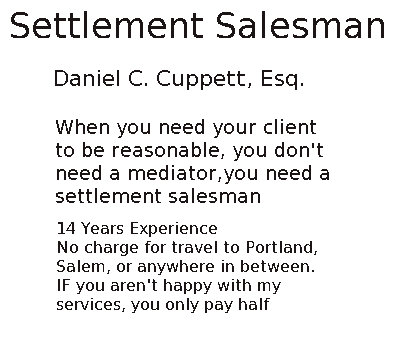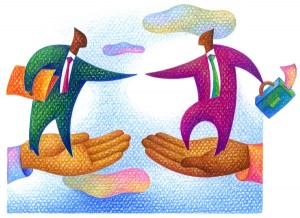Daniel C. Cuppett, Esq.
Education: B.A. – Philosophy (Summa Cum Laude) West Virginia University, 1996; J.D. (Order of the Coif – Graduated 5th in Law Class) West Virginia University, 1999. Basic and Advanced Alternative Dispute Resolution Training – WV State Bar 2001.
Bar Admissions: Maryland, 1999; West Virginia, 2000; Federal District Courts, Northern and Southern Districts West Virginia, 2000; Fourth Circuit Court of Appeals, 2000; New York, 2006, Oregon, 2010; Federal District Court, Oregon, 2012
Memberships: NOSSCR, American MENSA;
Practice Areas: Car Accidents, All Personal Injuries, Social Security Disability, SSI, Toxic Torts, Mediation, Arbitration, Attorney Marketing Consulting
Publications: So You’ve Been In an Accident. Now What?: A Practical Guide to Personal Injury Law, Silver Lake Publishing 2008.
I was born in a small town in the mountains of Western Maryland in 1974. As an undergraduate in college, I majored in philosophy, studying such diverse topics as ethics, formal and informal logic, metaphysics, philosophy of law, political philosophy, epistomology, and philosophy of language. I earned the distinctions of being both a Purinton Scholar and an Eberly Scholar. After receiving my undergraduate degree, graduating summa cum laude and receiving several awards in Philosophy, I immediately began law school. In law school, I took an early interest in personal injury law and co-authored a law review article involving insurance bad faith law. I received several awards in law school, including awards for receiving the highest grade in Torts II, Professional Responsibility (lawyer ethics), Property II, and International and Comparative Law Seminar, was a member of the West Virginia Law Review and graduated 5th in my class leading to induction into the Order of the Coif.
After law school, I practiced five years in northern West Virginia. During that time I exclusively handled automobile accident and other personal injury, medical malpractice, and employment discrimination cases. I also prepared basic Wills and Trusts. In the fall of 2004 I moved with his wife to Montreal, Quebec where she completed her medical residency in 2007. I began offering services as a consultant on personal injury law in northern New York and northern Vermont in 2004. During this time I also wrote a book for non-lawyers on the topic of personal injury law. It is meant not as a do-it-yourself guide, but rather a handbook for people who have attorneys representing them in personal injury matters and want to have a better understanding of the process. The book was released in March 2008 and is titled: So You’ve Been in an Accident, Now What?: A Practical Guide to Personal Injury Law was published.
In January, 2006 I officially became an associate attorney with the Law Office of Mark Schneider and in 2007 moved from Montreal to Plattsburgh, NY. In the Fall of 2009, I moved with his family from Plattsburgh to McMinnville, Oregon where I opened a personal injury and Social Security Disability practice. I also remain “of counsel” to the Law Office of Mark Schneider. This is a term used to describe an attorney who is a consultant to and works with a law firm in some capacity but is not an owner or employee of the firm. In addition to handling cases for clients, I offer mediation and arbitration services as well as marketing and advertising consulting to attorneys and law firms.




